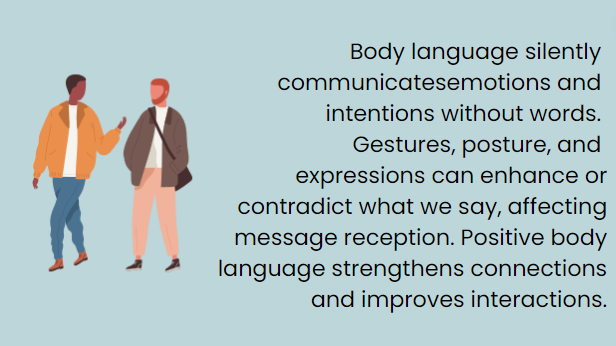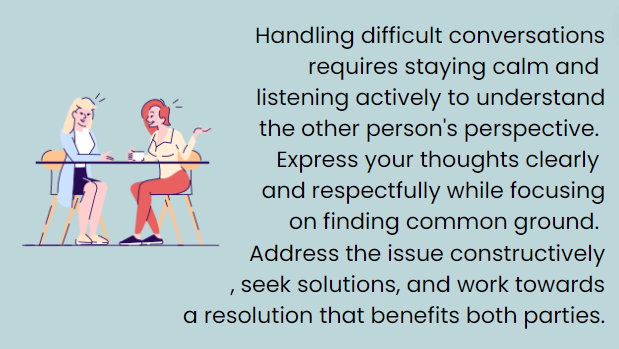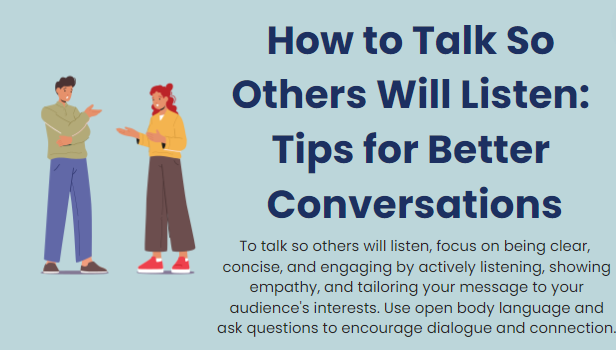In today’s fast-paced world, effective communication is more important than ever. Whether you’re in a professional setting, social gathering, or personal relationship, knowing how to talk so others will listen can make a significant difference in your interactions. This article will explore various techniques and strategies to enhance your conversational skills, ensuring that your words not only reach but also resonate with your audience.
The Importance of Active Listening
Before delving into how to talk effectively, it’s crucial to understand the role of active listening in communication. Active listening is the foundation of meaningful conversations and helps build trust and rapport with others.
Key aspects of active listening include:
- Giving your full attention to the speaker
- Maintaining eye contact
- Using nonverbal cues to show engagement
- Avoiding interruptions
- Asking clarifying questions
By practicing active listening, you set the stage for others to reciprocate when it’s your turn to speak.
Setting the Right Tone
The way you speak can significantly impact how others receive your message. Here’s a quick guide to help you set the right tone:
| Tone | Effect | When to Use |
|---|---|---|
| Calm | Promotes trust and openness | During conflicts or tense situations |
| Enthusiastic | Engages and motivates listeners | When sharing ideas or inspirational content |
| Empathetic | Builds emotional connections | When discussing personal or sensitive topics |
| Confident | Establishes authority and credibility | When presenting information or leading discussions |
Body Language: The Silent Communicator
Your body language speaks volumes before you even utter a word. To ensure your nonverbal cues align with your message:
- Maintain an open posture
- Use appropriate facial expressions
- Gesture naturally to emphasize points
- Respect personal space
- Mirror the other person’s body language subtly

Remember, consistency between your verbal and nonverbal communication is key to being perceived as authentic and trustworthy.
Crafting Your Message
To make your words more impactful and memorable, consider the following tips:
- Be Clear and Concise: Avoid unnecessary jargon or complex language. Get to the point quickly and clearly.
- Use Stories and Examples: Illustrate your points with relatable anecdotes or examples to make your message more engaging and easier to understand.
- Organize Your Thoughts: Structure your ideas logically, using transitions to connect different points smoothly.
- Employ the “Rule of Three”: Group information into threes, as it’s often more memorable and persuasive.
- Ask Thought-Provoking Questions: Engage your listeners by asking questions that encourage reflection and participation.
See also>> Misunderstandings That Can Break a Relationship
The Power of Empathy in Communication
Empathy is a crucial component of effective communication. When you demonstrate understanding and compassion, others are more likely to listen and respond positively. Here are some ways to incorporate empathy into your conversations:
- Try to see things from the other person’s perspective
- Validate others’ feelings and experiences
- Show genuine interest in their thoughts and opinions
- Respond with understanding, even if you disagree
- Use phrases like “I understand” or “That must be challenging” to show empathy
Adapting Your Communication Style
Different situations and audiences may require different communication approaches. Here’s a quick guide to help you adapt:
| Communication Style | Characteristics | Best Used When |
|---|---|---|
| Direct | Straightforward, concise | Time is limited or clarity is crucial |
| Collaborative | Inclusive, team-oriented | Working on group projects or brainstorming |
| Diplomatic | Tactful, considerate | Handling sensitive topics or conflicts |
| Inspirational | Motivating, visionary | Leading teams or presenting new ideas |
The Art of Persuasion
When you need to convince others or gain support for your ideas, consider these persuasive techniques:
- Appeal to Logic: Use facts, statistics, and rational arguments to support your point.
- Appeal to Emotions: Connect with your audience on an emotional level through stories or relatable experiences.
- Establish Credibility: Demonstrate your expertise or cite reputable sources to build trust.
- Offer Solutions: Present practical solutions to problems or challenges.
- Address Counterarguments: Anticipate and address potential objections to strengthen your position.
See also>> Fun Activities to Refresh Your Mind and Body
Handling Difficult Conversations
Sometimes, you may need to navigate challenging or sensitive topics. Here are some strategies to help you communicate effectively in these situations:
- Choose the right time and place
- Start with a positive or neutral statement
- Use “I” statements to express your feelings without blaming
- Focus on the issue, not the person
- Listen actively and show empathy
- Seek common ground and collaborate on solutions

The Role of Silence in Communication
While this article focuses on how to talk effectively, it’s important to recognize the power of silence in communication. Strategic pauses can:
- Give others time to process information
- Emphasize important points
- Encourage others to contribute to the conversation
- Help you gather your thoughts before responding
- Create a sense of anticipation or drama when appropriate
See also>> How to Give Feedback That Helps, Not Hurts: A Comprehensive Guide
Improving Your Verbal Skills
To enhance your overall verbal communication, consider the following:
| Skill | Description | How to Improve |
|---|---|---|
| Articulation | Clear pronunciation of words | Practice tongue twisters, read aloud |
| Pace | Speed of speech | Vary your speaking rate, use pauses effectively |
| Tone | Emotional quality of your voice | Practice modulating your voice, record yourself |
| Vocabulary | Range of words used | Read widely, learn a new word daily |
FAQs
Q: How can I overcome nervousness when speaking in public?
A: Practice deep breathing, prepare thoroughly, visualize success, and start with small speaking opportunities to build confidence gradually.
Q: What should I do if someone interrupts me frequently?
A: Politely assert yourself by saying, “I’d like to finish my thought,” or “Please let me complete my point.” If the behavior persists, address it privately.
Q: How can I improve my listening skills?
A: Focus on the speaker, avoid distractions, ask clarifying questions, and practice summarizing what you’ve heard to ensure understanding.
Q: Is it okay to use humor in serious conversations?
A: Used appropriately, humor can lighten the mood and make difficult topics more approachable. However, be mindful of the context and your audience.
Q: How do I know if my message is being understood?
A: Look for nonverbal cues, ask for feedback, and encourage questions. You can also ask the listener to summarize key points to check comprehension.
Conclusion
Effective communication is a skill that can be developed and refined over time. By implementing the strategies discussed in this article, you can significantly improve your ability to talk so others will listen. Remember that good communication is a two-way street, involving both speaking and listening. Practice these techniques consistently, and you’ll find your conversations becoming more engaging, productive, and meaningful.
